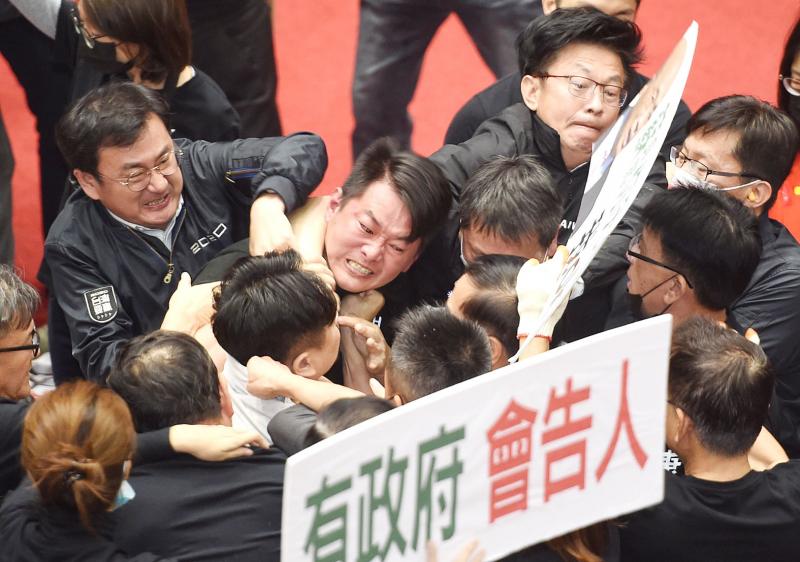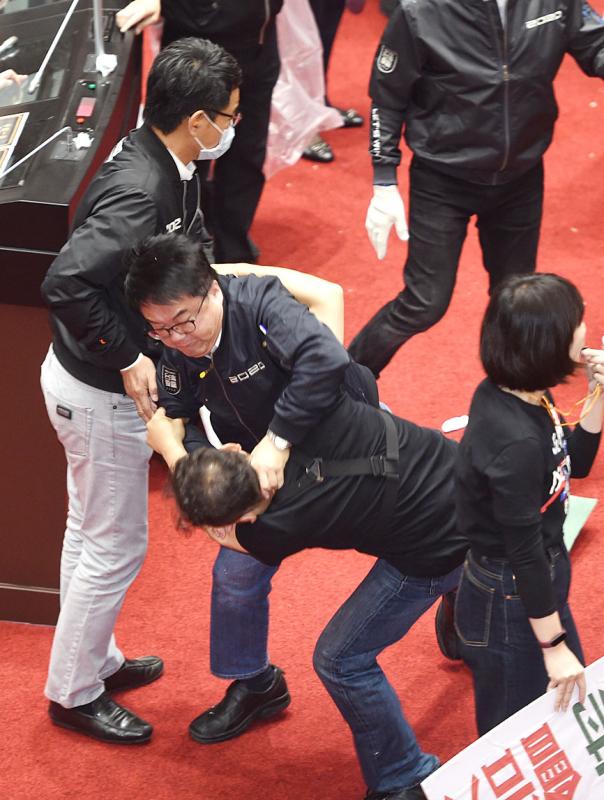Chinese Nationalist Party (KMT) lawmakers yesterday pelted Premier Su Tseng-chang (蘇貞昌) with pig skin and entrails as he addressed the Legislative Yuan on pork imports for the first time since the KMT’s boycott began on Sept. 18.
Opposition lawmakers have been demanding an apology from the government for its decision to lift its ban on the importation of US pork containing residues of the livestock drug ractopamine.
After Su arrived at 10am for his 13th attempt to deliver a regular policy report, the Democratic Progressive Party (DPP) caucus moved to change the agenda to accommodate the premier.

Photo: Liu Hsin-de, Taipei Times
The motion resulted in cries of dissent from across the aisle, as KMT Chairman Johnny Chiang (江啟臣) protested that Legislative Speaker You Si-kun (游錫堃) was rushing to a vote without addressing the KMT’s objection.
After the motion passed, Su took the podium at 10:20am surrounded by DPP lawmakers. KMT legislators attempted to drown him out with whistles and air horns, dumping buckets of pig skin and offal on the podium and the floor.
In his five-minute report, Su said that the government would continue its efforts to protect food safety in Taiwan with the same diligence applied to dealing with the COVID-19 pandemic and previously with African swine fever.

Photo: Liu Hsin-de, Taipei Times
There are to be on-site inspections at US meat factories, clear labeling of the products and strict enforcement of the regulations, he said.
Taiwan must open up to the international community and connect with the global economic network, Su said, adding that the US is Taiwan’s most powerful ally.
While Su gave his report, scuffles broke out between KMT lawmakers dressed in black shirts that read: “Oppose ractopamine pork, consider health,” and DPP representatives.

Photo: Ann Wang, Reuters
At one point, KMT Legislator Sra Kacaw (鄭天財) was knocked over by Taiwan Statebuilding Party Legislator Chen Po-wei (陳柏惟) when he bent over to grab a garbage bag. KMT caucus whip Lin Wei-chou (林為洲) and others leaped forward to drag Chen away by the neck, causing a scuffle to erupt that was quelled by DPP lawmakers.
Sra Kacaw later said that he was not shoved over, although Chen should not have pushed him.
The legislative floor was also dotted with placards from both sides, with slogans such as “Oppose ractopamine pork — not US pork” and “Much ado about nothing.”

Photo: Liu Hsin-de, Taipei Times
Afterward, Lin, Chiang and other KMT lawmakers convened a news conference outside the legislative chamber to apologize for the events of the morning while defending their actions.
Lin apologized for the KMT caucus’ use of pig entrails, saying that it was meant to emphasize that US offal containing ractopamine would be imported to Taiwan, as the US rarely utilizes these parts.
At the very least, the caucus is calling for complete factory inspections and clear labeling, he added.
Chiang said that the day’s proceedings were deeply flawed, from before the start of the session to You’s handling of legislative procedures, adding that Su never should have been allowed to take the podium.
“President Tsai Ing-wen (蔡英文) keeps claiming that this is for the nation’s benefit, but is public health not in the nation’s interest?” Chiang asked.
DPP lawmakers convened their own news conference shortly thereafter, accusing the KMT of losing their minds to factionalism.
The KMT in its calculations is no longer thinking about the country or the functioning of the legislature, DPP caucus whip Ker Chien-ming (柯建銘) said.
Under Chiang’s stewardship, instead of considering how to question the premier or ministers, the KMT is only concerned with how to destroy the legislative forum, Ker added.
The DPP called on its counterparts across the aisle to turn around its behavior or risk forever relegating itself to the status of opposition party.
Additional reporting by Huang Hsin-po and CNA

The Central Election Commission has amended election and recall regulations to require elected office candidates to provide proof that they have no Chinese citizenship, a Cabinet report said. The commission on Oct. 29 last year revised the Measures for the Permission of Family-based Residence, Long-term Residence and Settlement of People from the Mainland Area in the Taiwan Area (大陸地區人民在台灣地區依親居留長期居留或定居許可辦法), the Executive Yuan said in a report it submitted to the legislature for review. The revision requires Chinese citizens applying for permanent residency to submit notarial documents showing that they have lost their Chinese household record and have renounced — or have never

A magnitude 5.6 earthquake struck off the coast of Yilan County at 12:37pm today, with clear shaking felt across much of northern Taiwan. There were no immediate reports of damage. The epicenter of the quake was 16.9km east-southeast of Yilan County Hall offshore at a depth of 66.8km, Central Weather Administration (CWA) data showed. The maximum intensity registered at a 4 in Yilan County’s Nanao Township (南澳) on Taiwan’s seven-tier scale. Other parts of Yilan, as well as certain areas of Hualien County, Taipei, New Taipei City, Taoyuan, Hsinchu County, Taichung and Miaoli County, recorded intensities of 3. Residents of Yilan County and Taipei received

Taiwan has secured another breakthrough in fruit exports, with jujubes, dragon fruit and lychees approved for shipment to the EU, the Ministry of Agriculture said yesterday. The Animal and Plant Health Inspection Agency on Thursday received formal notification of the approval from the EU, the ministry said, adding that the decision was expected to expand Taiwanese fruit producers’ access to high-end European markets. Taiwan exported 126 tonnes of lychees last year, valued at US$1.48 million, with Japan accounting for 102 tonnes. Other export destinations included New Zealand, Hong Kong, the US and Australia, ministry data showed. Jujube exports totaled 103 tonnes, valued at

BIG SPENDERS: Foreign investors bought the most Taiwan equities since 2005, signaling confidence that an AI boom would continue to benefit chipmakers Taiwan Semiconductor Manufacturing Co’s (TSMC, 台積電) market capitalization swelled to US$2 trillion for the first time following a 4.25 percent rally in its American depositary receipts (ADR) overnight, putting the world’s biggest contract chipmaker sixth on the list of the world’s biggest companies by market capitalization, just behind Amazon.com Inc. The site CompaniesMarketcap.com ranked TSMC ahead of Saudi Aramco and Meta Platforms Inc. The Taiwanese company’s ADRs on Tuesday surged to US$385.75 on the New York Stock Exchange, as strong demand for artificial intelligence (AI) applications led to chip supply constraints and boost revenue growth to record-breaking levels. Each TSMC ADR represents